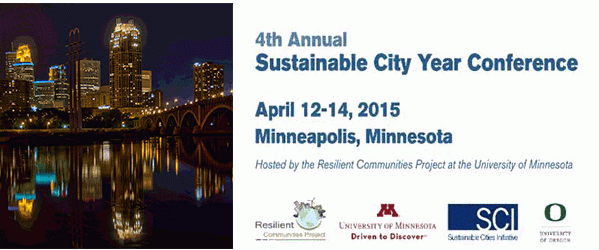The Fourth Annual Sustainable City Year Conference was hosted this year by the University of Minnesota’s Resilient Communities Project. The conference was designed to meet the needs of both established programs patterned on the Sustainable City Year (SCY) model originally developed by the University of Oregon, and university representatives, city officials, and organizational partners interested in adopting and adapting the model to their home institutions and community contexts.
What Is the SCY Model?
The Sustainable City Year model is a catalytic learning model first developed at the University of Oregon that leverages existing courses at higher education institutions to work on applied community projects identified by community partners (i.e., a city, county, school district, or transit district) for an entire academic year. Some of the distinguishing features of the SCY model of engaged learning include the scale and intensity of the partnership, the place-based and multi-disciplinary nature of the program, and a focus on advancing local sustainability. The large-scale approach provides a wide range of benefits for students, faculty, universities, and communities.
The SCY model has been adopted by colleges and universities around the country, including the University of Minnesota, where the Resilient Communities Project (RCP) was launched in 2012 after staff attended the First Annual SCY Conference. Now in its third year of operation, RCP typically matches 15-30 community-identified projects with 30+ courses across dozens of departments and disciplines engaging 400+ students to work with a single community partner each year.
The SCY model has now been adopted and adapted by more than a dozen institutions of higher education across the United States and abroad.
Praise from Conference Attendees
"This was by far the most valuable conference I have attended. [SCY] really is a winning model, and can be replicated with very little resource investment. The conference provided our team all of the tools we needed to get our own program up and running, and establish buy-in among the campus and community. This conference was an absolute game changer for us."
—Kelly Ellenburg of the Smart Communities Initiative, University of Tennessee
“Excellent event. It was a delight to be around so much enthusiasm and real-world impact. This is really a model of the kinds of programs we should all be doing more of. I can’t wait to start rolling things out. Thank you thank you thank you!!!!
“I thoroughly enjoyed and learned a lot from this conference, which was well-run from top to bottom.”


